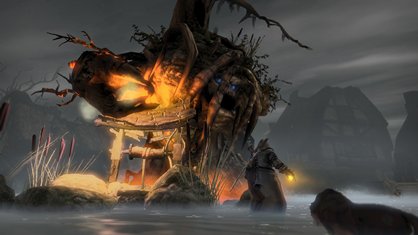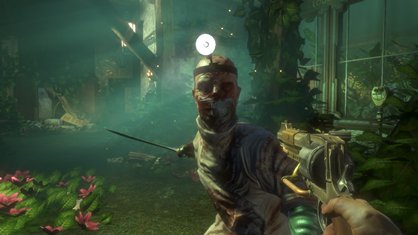The game developers who've NEVER made a bad game
Unbelievable but true; some studios CAN score a flawless victory
But no. Given that we set ourselves the rule that we would only include currently active studios with a relatively lengthy history, eclectic spread of output, or both, skeleton after skeleton sprang from closet after closet, and countless reputations were crapped upon by long forgotten stinkers from the early "We needed the money, okay?" days, as we tirelessly scoured through ancient back catalogues (Blizzard, we're looking at you). Many fell. Few maintained dignity. But this friends, is the hall of fame inhabited by those few. Read on, and find out how they managed it.

Selected notable releases: Black & White series, The Movies, Fable, Fable II
Say what you like about Peter Molyneux's ebullient enthusiasm; the man makes good games. Maybe not always as good as he wants them to be, but if a developer's biggest problem is unrealistic ambition then there's not really a great deal to complain about. Lionhead might not always turn in everything they initially plan (just like flamethrowers aren't always great for ice sculpture), but that just means that even the studio's 'failed' ideas usually overshoot those of the average jobbing dev.

Lionhead is also notable for the fact that it's one of the few triple-A studios left whose games still have a uniquely British sensibility. Where the Brit voice and sense of humour so apparent in '80s gaming was largely homogenised out of the industry years ago (Rare excepted), Lionhead steadfastly refuses to lose its identity, however risky that may be when selling to a global audience (though given the success of the fiercely provincial Fable II, perhaps the larger market is starting to want more of that voice now). Driven by ideas rather than genres and always pushing innovation, even past the point of realism, Lionhead is one of the most unique and intriguing studios currently affiliated with any first-party, and one which Microsoft should be very smug indeed to have on-side.

Selected notable releases: Half-Life series, Left 4 Dead, Portal, Team Fortress series
With the ability to digitally self-distribute to the PC market through Steam, Valve has engineered a high-yield, low overhead model which has left it a good deal more free to explore original ideas and designs. Couple this with a powerful radar for recruiting emerging talent from the amateur, indie and mod scenes (see the origins of Portal, Left 4 Dead, Team Fortress and a good number of Valve's staff in general), and you've got a developer in a very healthy state when it comes to freshness, originality and fun.

And it's not just the component parts, but the ways in which they interact which keeps Valve exciting. In contrast to the compartmentalised hierachy of most corporations, there are no set job roles at the House o' Gabe, cultivating a vastly collaborative atmosphere where cross-pollination of ideas and fresh perspectives on design decisions can come from anywhere. Top it all off with a "When it's ready" attitude towards release schedules and you've got possibly the most autonomous and commerically and artistically successful developer around.
Sign up to the GamesRadar+ Newsletter
Weekly digests, tales from the communities you love, and more

Selected notable releases: System Shock 2, Freedom Force, Tribes: Vengeance, SWAT 4, Bioshock (as 2K Boston)
Irrational was primed for success from the very start. Formed by previous staff of Looking Glass Studios, lauded creator of Ultima Underworld, System Shock and Thief, it promised very interesting things from day one and has delivered ever since. Working together at the "game design university" of LGS gave founders Ken Levine, Jon Chey and Robert Fermier a comprehensive grounding in innovative design and well-told story, and if you need any more evidence of the importance of that heritage, note that the eventual end of Looking Glass also freed up a couple of guys called Warren Spector and Harvey Smith to work on a little game called Deus Ex at Ion Storm. Look it up. We've heard that it's not bad.

But while depth of story and realisation of environment have often earned the studio its plaudits, it would be wrong to put everything down to Ken Levine's screenwriting background. Rather, 2KB is a studio which emphasises player empowerment through solid, stimulating and consistent gameplay mechanics. Yes, Rapture is a stunningly original achievement, but it would be nothing unless built around Bioshock's vastly differing AI models. The genetic apocalypse, Ryan's rampant Objectivism and that plot twist might stick in the mind long after completing the game, but all are essentially literary offshoots of Bioshock's central gameplay concepts. In 2K Boston we have a studio with a fierce respect of the player experience, but also one with the brains and artistic sensibilities to make gameplay central to a truly affecting whole.

Selected notable releases: Frequency, Amplitude, Guitar Hero series, Rock Band series
Of course, the rhythm game has been around since the launch of Parappa the Rapper and Dance Dance Revolution, but just as happened to platformers with the release of Super Mario Bros., Harmonix began the true evolution of the genre with Frequency and Amplitude in 2001 and 2003 respectively. And just like Nintendo did, with those two games the studio made the genre its own. The central concepts and mechanics of those early titles can be seen threaded throughout the majority of the dev's work, and it is this iterative approach which is the studio's greatest strength (aside from the repeated, gratuitous use of Freezepop on its games' soundtracks, obviously).

Rather than seeing the music game as a novelty or gimmick, as many have, Harmonix has made it its mission to understand and hone visual interaction with music, taking its basic concept and pushing it further and further with each new version, be it by mechanics, peripherals or social interaction. This is a company which operates outside of traditional gaming and uses that placement to its advantage, focusing on attaining a single goal through all explorable avenues and becoming ever more ambitious each time. The fact that it achieves this via a slyly clever blending of hardcore gaming skills and simple, casual gaming goals just cements Harmonix's place on this list.



